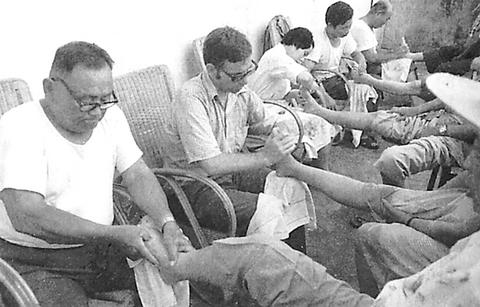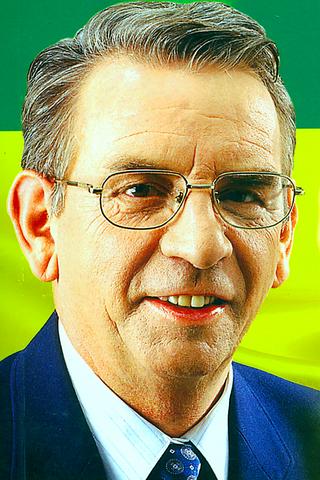Father Josef Eugster may not be the best evangelist for converting people to Christianity. He may not have touched the hearts of millions of Taiwanese, but he's easily Taiwan's most famous and influencial foreign priest for having touched people's feet. He declares his pioneering foot massage in Taiwan to be "God's gift."
"This is Chang-pin Catholic Church, I'm Father Wu Ro-shih," 62-year-old Eugster said in fluent Mandarin when answering a phone call from the Taipei Times. Actually, Father Eugster's accent is more Taiwanese because the first language he learned when arriving in Taiwan 30 years ago was Taiwanese.

PHOTO COURTESY OF FATHER JOSEF EUGSTER
Back then, a shy young man from the Swiss village of Berneck came to Taiwan's east coast town of Taitung, where people pray in shrines and Amis Aborigines hunt and hold ceremonies by the sea. The only plan he had in mind was to serve God. But how?

PHOTO COURTESY OF COSMAX PUBLISHING
"It is really difficult to try to preach to Taiwanese!" Father Eugster said. He recalled that during his first few years in Taitung, his sermons always made people doze off. "I prayed to God, asking him to give me a good method for preaching, and then He made me sick," Eugster said. Now he says he's grateful that he was troubled by arthritis -- if he weren't, he would not have read the book about reflexology and began massaging first his own and then other people's feet.
When an old man was leaving the church following mass, he looked uninterested in my sermon and complained of a headache. "I grabbed his feet, saying `please give me five minutes,'" Eugster said. "I showed him, `here is a reflex area for your headache' and began massaging it for him." Like that, Eugster found his new method of preaching. Unlike other Western priests, who often bring rice or flour to remote villages, Father Eugster brings his hands.
His Taitung Catholic church has been packed ever since. There are often even hundreds of people lined up at the door of the church at midnight. One time, Eugster was too exhausted from doing massage and fell ill with nephritis. "I was hospitalized and couldn't do any massage, so I asked them to go to the beach to find pebbles to step on," Eugster said. This became the origin of "pebble paths" meandering through many of Taiwan's parks.
"Ninety percent of the people came to the church just for their health problems, only 10 percent were interested in the spiritual," Eugster said. But he never gives up hope. "Maybe in 10, 20 years, they will want to listen to God's words," he said.
Fame has brought its share of trouble. In 1980, people abusing his name began prescribing medicine. His taxes were checked and the Department of Health charged him with practicing medicine without a doctor's certificate. "I even received calls [from people] threatening to kill me," he said.
Eugster took an eight-month leave to study in Jerusalem. "I was actually suffering from neurasthenia and couldn't sleep at nights. I needed a break to find myself again," he said.
As foot massage became popular in urban areas, with his name and picture widely printed on clinics' signboards, Father Eugster returned to Taiwan's remote villages. Back from Jerusalem, he was transferred to Chang-ping, a small village at the border between Hualien and Taitung, distancing himself from money and fame.
"This is the most beautiful place in the world, with mountains and the sea. I have a farm for growing vegetables and I often go swimming in the sea, and sometimes fishing," he said.
Now with his schedule packed with speaking engagements, visiting a circuit of churches Amis tribes and practicing massage, Eugster has managed to find some time to learn the Amis language.
Surprisingly, even after 23 years of having massaged celebrities and politicians, his charge remains a modest NT$350 for a half-hour massage, lower than in most clinics.
Despite his fame, Father Josef Eugster remains a simple man. "Two months ago, I was given an air-conditioner, donated by disciples. It was my first air-conditioner," Eugster said.

Google unveiled an artificial intelligence tool Wednesday that its scientists said would help unravel the mysteries of the human genome — and could one day lead to new treatments for diseases. The deep learning model AlphaGenome was hailed by outside researchers as a “breakthrough” that would let scientists study and even simulate the roots of difficult-to-treat genetic diseases. While the first complete map of the human genome in 2003 “gave us the book of life, reading it remained a challenge,” Pushmeet Kohli, vice president of research at Google DeepMind, told journalists. “We have the text,” he said, which is a sequence of

On a harsh winter afternoon last month, 2,000 protesters marched and chanted slogans such as “CCP out” and “Korea for Koreans” in Seoul’s popular Gangnam District. Participants — mostly students — wore caps printed with the Chinese characters for “exterminate communism” (滅共) and held banners reading “Heaven will destroy the Chinese Communist Party” (天滅中共). During the march, Park Jun-young, the leader of the protest organizer “Free University,” a conservative youth movement, who was on a hunger strike, collapsed after delivering a speech in sub-zero temperatures and was later hospitalized. Several protesters shaved their heads at the end of the demonstration. A

Every now and then, even hardcore hikers like to sleep in, leave the heavy gear at home and just enjoy a relaxed half-day stroll in the mountains: no cold, no steep uphills, no pressure to walk a certain distance in a day. In the winter, the mild climate and lower elevations of the forests in Taiwan’s far south offer a number of easy escapes like this. A prime example is the river above Mudan Reservoir (牡丹水庫): with shallow water, gentle current, abundant wildlife and a complete lack of tourists, this walk is accessible to nearly everyone but still feels quite remote.

In August of 1949 American journalist Darrell Berrigan toured occupied Formosa and on Aug. 13 published “Should We Grab Formosa?” in the Saturday Evening Post. Berrigan, cataloguing the numerous horrors of corruption and looting the occupying Republic of China (ROC) was inflicting on the locals, advocated outright annexation of Taiwan by the US. He contended the islanders would welcome that. Berrigan also observed that the islanders were planning another revolt, and wrote of their “island nationalism.” The US position on Taiwan was well known there, and islanders, he said, had told him of US official statements that Taiwan had not